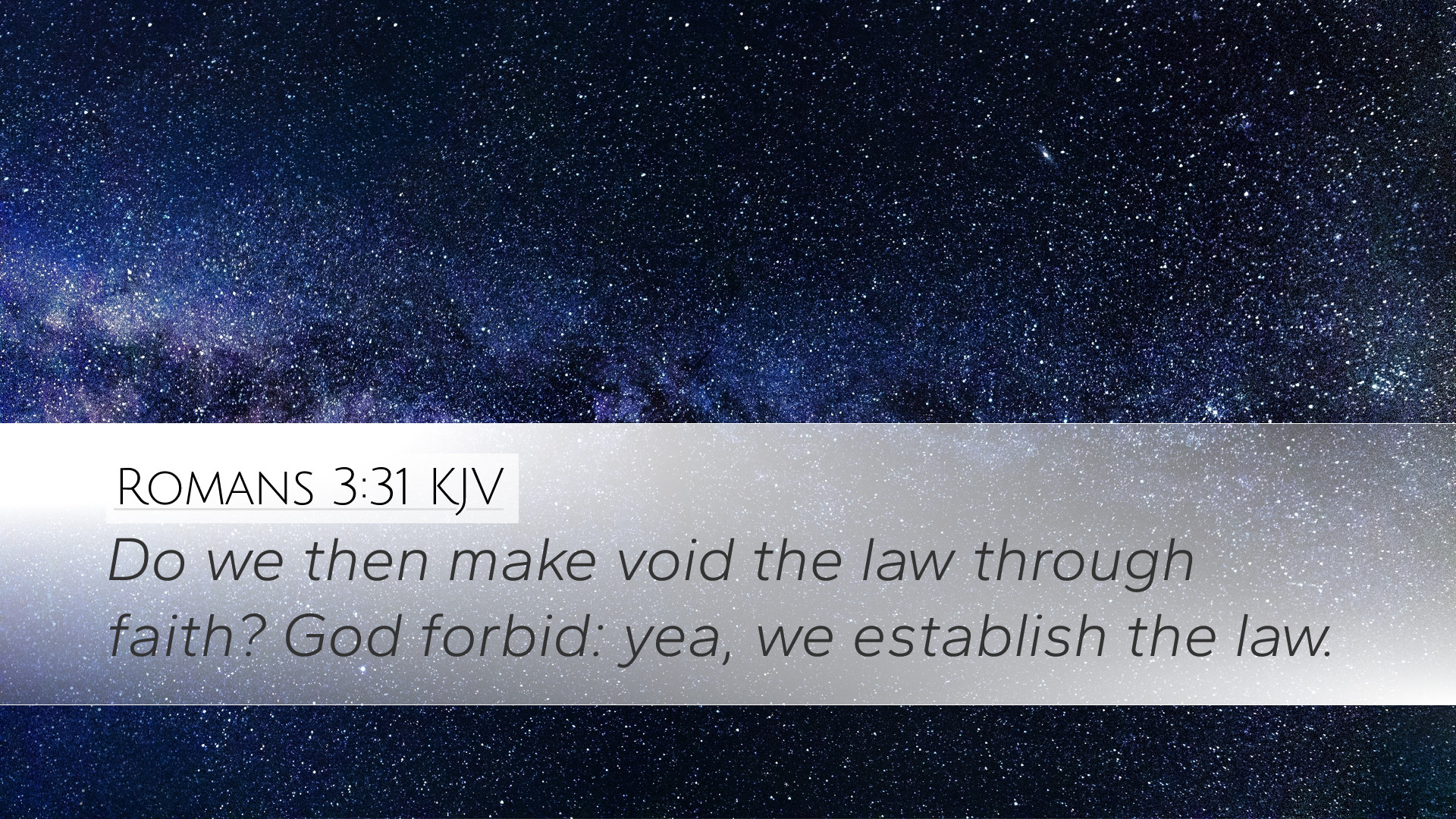Commentary on Romans 3:31
In Romans 3:31, the apostle Paul addresses a critical issue pertaining to the Law and faith, presenting profound implications for both Christian doctrine and practice. The verse reads, "Do we then make void the law through faith? God forbid: yea, we establish the law." This commentary synthesizes insights from various public domain sources, primarily from Matthew Henry, Albert Barnes, and Adam Clarke, to provide a comprehensive understanding of this verse.
Contextual Overview
The Book of Romans, authored by the Apostle Paul, delves into the theological significance of righteousness, faith, and the relationship between the Jew and Gentile in light of the Gospel. The context surrounding Romans 3 emphasizes the universal sinfulness of humanity and the necessity of faith in Christ for justification. Romans 3:31 serves as a conclusion to the discussion on the relationship between faith and the law.
Exegesis of Romans 3:31
This verse can be dissected into two distinct but interconnected elements:
- The Voidness of the Law: The phrase “make void the law” addresses a concern that, by emphasizing faith, the significance of the Law is diminished or set aside.
- Establishing the Law: Paul’s declaration that we “establish the law” counters any notion of antinomianism, reinforcing that true faith in Christ fulfills the law's requirements.
Matthew Henry’s Insights
Matthew Henry emphasizes the idea that faith does not abolish the law but rather fulfills it. He notes that:
- Faith is the means through which believers are justified, yet the righteousness demanded by the law is still applicable.
- Henry states that “faith brings us to Christ, and in Him we have the fulfilling of the law.”
- He highlights that genuine faith naturally leads to obedience, aligning the believer's life with God’s commandments.
Albert Barnes’ Commentary
Albert Barnes approaches the verse by addressing the doctrinal tension between law and grace. He observes that:
- The law's role, while foundational, has been elevated by faith, as it points to the need for Christ's redemptive work.
- According to Barnes, the true establishment of the law comes not through strict adherence to regulations but through the transformation of the heart via faith in Jesus Christ.
- He warns against the misconception that liberation from the law results in moral decay, arguing instead for a higher moral standard achieved through faith.
Adam Clarke’s Perspective
Adam Clarke provides a nuanced commentary regarding the reconciliation of faith and law. He comments that:
- The apostle Paul defends the harmony between faith and the law; both serve integral roles in God's redemptive plan.
- Clarke suggests that the moral principles of the law remain vital for the believer, arguing that true faith empowers one to fulfill the law's demands rather than undermine them.
- His analysis articulates that the law serves as a guide and that Christians are called not merely to observe the law but to embody its essence through the Spirit of God.
Theological Implications
The implications of Romans 3:31 extend into various theological discussions:
- Faith vs. Works: The relationship between faith and works has long been debated. This verse affirms that faith establishes the righteous requirement of the law rather than nullifying it.
- Grace and Obedience: The establishment of the law through faith sets a precedent that grace does not abolish the moral obligations of believers but empowers them towards obedience.
- The Nature of True Faith: True faith includes a commitment to God’s moral law. Genuine transformation in a believer's life results in a desire to fulfill God’s commands, hence the establishment of the law.
Practical Applications for Believers
For pastors, students, and theologians, several practical applications emerge from this verse:
- Encouragement in Faith: Individuals are encouraged to find assurance in their faith, recognizing that salvation through Christ does not lead to lawlessness but to a heart aligned with God's standards.
- Teaching on Righteousness: Pastors should emphasize that faith in Christ necessitates an active response to God’s moral expectations, fostering a culture of holiness amongst congregants.
- Understanding of the Law's Purpose: Bible scholars must convey a nuanced understanding of the law as foundational in guiding believers towards righteous living, undergirded by faith.
Conclusion
Romans 3:31 serves as a pivotal verse that encapsulates the relationship between faith and the law. The insights from esteemed commentators—Matthew Henry, Albert Barnes, and Adam Clarke—synthesize a profound understanding that enhances our theological viewpoints and practical Christian living. While faith is the mechanism of justification, it does not negate the law but rather establishes it in the life of believers. Through faith, the moral and righteous standards of the law are not merely adhered to but fulfilled in a believer's life, empowering them to live in a manner pleasing to God.


